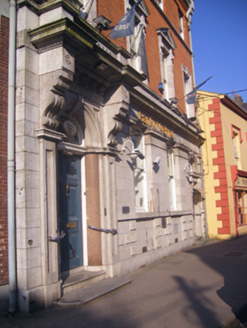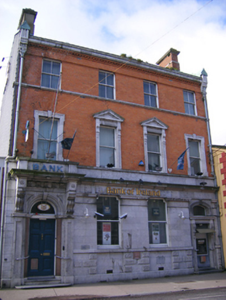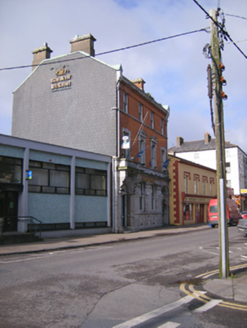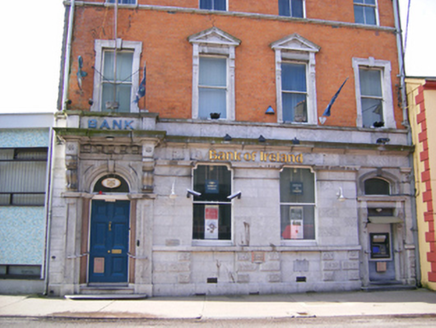Survey Data
Reg No
20823060
Rating
Regional
Categories of Special Interest
Architectural, Artistic, Historical, Social
Original Use
Bank/financial institution
In Use As
Bank/financial institution
Date
1880 - 1885
Coordinates
210386, 78056
Date Recorded
22/03/2007
Date Updated
--/--/--
Description
Attached four-bay three-storey bank and manager's house, built 1881, now in use as bank. Pitched slate roof with rendered and brick chimneystacks and cast-iron rainwater goods. Ashlar limestone walls having carved limestone entablature and rusticated blocks below windows, to ground floor. Scottish bond brick walls to upper floors, with ashlar limestone continuous sill course to second floor. Ashlar limestone eaves course with terminating carved consoles, set over brick hounds tooth course. Carved limestone surrounds to first floor openings, having pediments to central bays. Recent artificial slate hangings to gable ends. Square-headed openings having two-over-two pane timber sliding sash windows to second floor and one-over-one pane windows to first floor. Shouldered square-headed openings to ground floor having one-over-one pane timber sliding sash windows. Round-headed opening with carved limestone surround comprising heavy entablature with dentil course and carved brackets. Carved consoles with foliate motifs over Doric-style panelled pilasters. Glazed fanlight over timber panelled door, flanked by granite engaged columns. Limestone steps to entrance. Elliptical-headed door opening with carved surround, flanking pilasters, consoles, keystone and overlight, now blocked to accommodate cash machine.
Appraisal
Designed by architects Millar and Symes, this bank is a fine addition to the streetscape. The ashlar limestone and finely carved elements utilized in the construction of this building were clearly executed by skilled craftsmen. The red brick and grey limestone add colour and textural interest. The two entrance doors, one now partially blocked up, are interesting reminders of the provisions made for bank manager's accommodation on the upper floors of purpose-built banks in the late nineteenth and early twentieth-centuries in Ireland.







